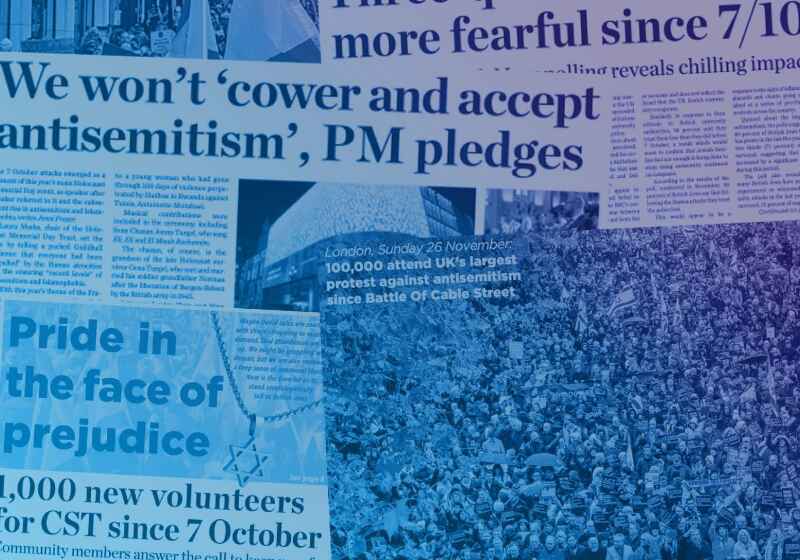CST Blog
The anti-war left’s problem with antisemitism
9 March 2016
The below article is the original version of an opinion piece published by the Jewish Chronicle on 3 March 2016. The JC entitled it as “Anti-war activists still don't 'get' antisemitism”.
Jon Lansman’s article in last week’s JC, “My doubts about Oxford Labour antisemitism claim”, showed that whether or not the left “has some kind of problem with Jews” (as has been alleged), it certainly has a problem in talking about and dealing with antisemitism.
Lansman is a key Jeremy Corbyn ally. He told JC readers that he knows the Oxford Labour students and he knows they are not antisemitic. Perhaps this is why he did not bother mentioning details, such as what the students said and how they behaved.
I will do likewise. I know the allegations but will not repeat them. Besides, I was distinctly un-shocked by them, having myself faced similar abuse on campus in the 1980s, as did all of us who opposed Jewish student societies being banned by the forebears of today’s Oxford students.
Neither am I belittling the allegations, by noting that they are not so very much worse than the hysterical denunciations of Israel and Zionists that are routinely expressed in Stop the War circles. This is why, for want of a better phrase, I call this the anti-war left, because Stop the War was its political centre and was chaired by Jeremy Corbyn from 2011-15.
Lansman told the JC he wants “a proper impartial inquiry” into the Oxford allegations and says antisemitism “right or left…should be condemned”. It would be refreshing if the anti-war left’s definitions of “antisemitism” and “proper impartial inquiry” chimed with our own interpretations, but this controversy may yet further polarise relations between mainstream Jews and the anti-war left. It is commonly depressing in leftist settings for those complaining about antisemitism to themselves end up becoming the accused. That scenario is made even more likely here, because the outcome of this controversy involves internal Labour power plays. This is what Lansman hinted at when writing, “some people have [Labour] factional reasons for stoking the flames of the bandwagon”.
Lansman’s JC piece opened with his own strong opposition to antisemitism, stressing how it and the Holocaust shaped his own universal values. The article ended by attacking Benjamin Netanyahu. I believe Lansman is entirely sincere, but closing with a Netanyahu attack leaves the impression that the Israel bash is equally, perhaps more, important to him. How many times have we heard this record? We condemn antisemitism and care deeply about the Holocaust, but don’t leave without hearing our condemnation of Israel!
Lansman says “context” is key to judging antisemitism. He acknowledges some leftists use “Zionist, Jewish and Israeli interchangeably, as if they mean the same thing”. For me, this fusion is crucial to contemporary antisemitism, including the feelings of many Jews. Society has many centuries of knowing how to hate Jewish things, so the levels of hatred singled out at Israel invite antisemitic thinking, exclusions and actions. Lansman seems less concerned. He calls the language “sloppy…always ill-advised and counter-productive…sometimes…an indicator of antisemitism”, but says this “can only be judged in context and is often not the case”.
I agree that context is a crucial indicator of racism, but do not recall other forms of racist language being afforded such benefit of the doubt in these circles. Indeed, Lansman immediately goes further, stating, “If the context fails to demonstrate that the intent is antisemitic, then to levy the charge of antisemitism is at best to diminish and at worse to trivialise a serious matter. If admonishment is still due, it should be for a significantly lesser offence”.
This amounts to a free pass for anyone in the anti-Israel and anti-Zionist left who self-defines as opposing antisemitism. It is lecturing Jews on antisemitism, telling us that the intent of the perpetrators (and their supporters) matter more than mainstream Jewish fears and experiences.
Next, Lansman lectures us on freedom to criticise Israel and Zionism. Again, we’ve been here before. How often must we repeat that criticism is fine, but calling this mere “criticism” denies its obsessive and hateful nature.
Lansman ignores what, for me, is the most important context of all: the condition of European Jewish communities after well over a decade of high antisemitic crime levels, punctuated by brutal terrorist murders. On this, the silence from these opponents of antisemitism is deafening. It is profoundly contrasted by concerns expressed across the political spectrum, including within the rest of the Labour Party. Yet Lansman has the chutzpah to say that some of those currently “castigating Jeremy Corbyn…have little interest in combating antisemitism”.
Even more chutzpahdik is Lansman’s attempt to thank “in part” Ken Livingstone for “efforts to eradicate” racism and antisemitism in Labour, whereas one week previously Livingstone told LBC Radio that in 45 years of Labour Party activism, he had seen no antisemitism! And that, in a nutshell, encapsulates the anti-war left’s problem with antisemitism.


